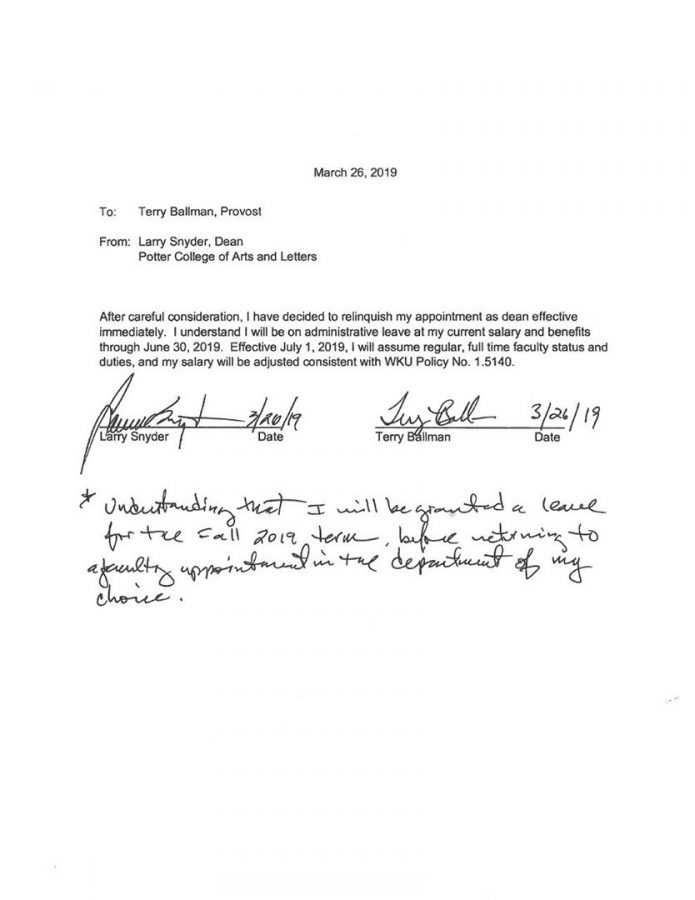Faculty calls for special University Senate meeting
April 2, 2019
Confusion and fear have been the primary responses from faculty across campus following the resignation of Larry Snyder from the dean of Potter College of Arts and Letters position last week.
One week later, the faculty have yet to receive a reason from Provost Terry Ballman as to why Snyder resigned.
Jane Olmsted, department head of Diversity and Community Studies within Potter College, said she did not know why Snyder was asked to resign and added that any sudden resignation of a dean is likely to increase anxieties. She said the manner in which Snyder was “told to resign” sent a call to action to the community.
“Given how hard the deans on this campus work, how much they are accountable for, how many people they support, how many fires they have to contain, how many innovations or just plain sound academic choices require their blessing, we might as a community feel a great deal of concern for the disruption to our friends’ and colleagues’ lives and work,” Olmsted said.
Ballman announced Snyder’s resignation on March 26 in an email to faculty. In the same message, she announced former chancellor for WKU’s Glasgow campus Sally Ray would fill the interim dean position. Just three days later, WKU confirmed that Ray had declined the interim dean position.
On Monday, Ballman announced in an email to Potter College faculty and staff that Merrall Price, special assistant to the provost and English professor, will be named interim dean beginning May 1.
On Monday April 1, University Senate Chair Kirk Atkinson announced in an email that he had received the necessary requests to call a special meeting of the University Senate. By the Senate charter, 10 senators are required to request a special called meeting. Atkinson said he received requests from 14 senators.
The topic of the meeting is restricted to “Concerns about, Implications of, and Potential Responses to Recent Administrative Decisions,” according to the email.
In an interview, Atkinson said this was the first time he has been involved with a special called meeting. He said these meetings are not reserved for “mundane” matters, and usually indicate significant issues and means there is “considerable concern.”
History Department Head Eric Reed said he disagreed with Ballman’s decision about Snyder but understands it is the provost’s prerogative to bring in new leadership.
“The implementation of this decision was handled very poorly, though, and the resulting fallout may end up being as disruptive as the decision itself,” Reed said. “This fallout and disruption should have been foreseen, I think.”
Robert Dietle, interim director of the School of Journalism and Broadcasting, said he attended a meeting held between Potter College department heads and Ballman last week in which Snyder’s resignation was discussed.
“I thought her responses [to Snyder’s resignation] were not satisfactory,” Dietle said.
Scott Harris, Music department head, said Snyder was an “outstanding dean.” Harris said Snyder would attend many events within the department, was a supporter of the arts and humanities and communicated the needs of the college.
“That resignation was very surprising and sudden,” Harris said. “Right now, we in Potter College are a little uncertain for the future.”
Barry Kaufkins, an instructor for Folk Studies and Anthropology, said he believes faculty members in the Potter College are currently afraid to speak out against Ballman’s actions.
“Dean Snyder’s abrupt ‘resignation’ sent a clear message to the rank and file: fail to toe the line and you could be next,” Kaufkins said.
Reporters Nicole Ziege, Jack Dobbs and news editor Rebekah Alvey contributed to this story. They can be reached at 270-745-6011 and [email protected].




















![Students cheer for Senator at Large Jaden Marshall after being announced as the Intercultural Student Engagement Center Senator for the 24th Senate on Wednesday, April 17 in the Senate Chamber in DSU. Ive done everything in my power, Ive said it 100 times, to be for the students, Marshall said. So, not only to win, but to hear that reaction for me by the other students is just something that shows people actually care about me [and] really support me.](https://wkuherald.com/wp-content/uploads/2024/04/jadenmarshall-600x422.jpg)



